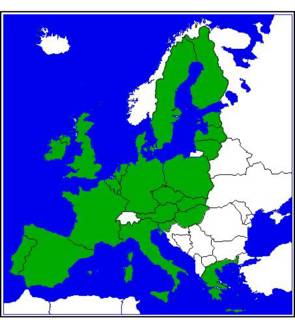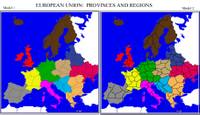
Current British Interference
How Great Britain is sabotaging the EU. The last time the British Isles were subject to foreign domination was the Norman era a millennium ago. It has since been its primary goal in foreign policy to keep the European subcontinent divided. Everytime a major power would rise, England would weave alliances against it to protect its own sovereignty. Look at it, England was opposed to the communist Soviet Union, before that Hitler and the Kaisers Germany, before that Napoleonic France, etc.
The peaceful coming together of European nations presents a new challenge to British diplomacy: how to hamstring the EU. The European Union is the culmination of the 50 years efforts. Its dream is the creation of a superstate in a contiguous region of Europe. It has wisely been introduced in a slow, steady, series of phases:
Phase I was the monetary unification: the Euro
Phase II is expansion and introduction of real legislative power
Phase III will be an empowering of the executive branch of the EU
We are currently in phase II. Great Britain, especially the ultra-conservatives have been violently opposed to membership in the EU. They reason correctly that it will lead in time to a loss of sovereignty. Their shortsightedness however keeps them from seeing the alternative: a weak and divided Europe in a global market of increasingly competitive and aggressive capitalism. As the European powers used to divide and conquer, dominating trade routes, and fueling empire, so could China, India, and a host of other superstates that are currently in embryonic form in the third world. The UK conservatives are ultimately shooting their countries long
term interests out.
The EU need walk cautiosly here. If Britain cannot be seduced to overcome its inhibitions on full membership, it should be left out entirely. As well, the temptation to even entertain the idea of a Turkish membership need be quashed right here and now. Turkey is an exploding Islamic hotbed. It is delusional to think that their integration will lead to anything but instability and exploitation, possibly even dissolution of the EU body. Would Morocco or Iraq be next?
Bring in all of the former Yugoslav republics, Albania, and the Ukraine. Leave an open door for Iceland, Norway, and Switzerland. Allow potential for Belarus and should they opt out, the UK at some point. But move on. Delay equals death.

Government
Instead of being a superstate of nations, the borders of the provinces in the EU need to be redefined. Anyone who has travelled Europe understands clearly how diverse the different regions, even within each country are. Yet there are concise patterns of language, religion, and culture in general. Subdivide each nation into its component regions and make these the basis for representation in the greater legislative body of government. For instance: on the Iberian peninsula we would have Portugal, Catalonia, the Basque counry, Galicia, Andalucia, and Castilla. Each region could have certain powers within its territory, and elect 1 or 2 representatives to the national assembly. In all, there would likely be 100 or so regions in the realm of the EU.
Should Great Britain eventually grow up and join the future, they would likely have 3 regions: Wales, Scotland, and England. Until that day, let them either ride the bus or get off.

Geopolitical model for the EU
This will be organized in regions consisting of a number of provinces. Each region and province therein should be in similar size and population as realistically possible to best attain a balance. Each of these provinces can further be subdivided into counties, districts, localities, etc. Keep in mind each of these is merely a suggestion based on shared language, custom, religion, and culture, and should by no means be considered to be a final map.
PROVINCES
Iberia
Brittania
Francia
Germania
scandinavia
Baltics
Slavia
Italia
Adriatica
Balkans
Ukraine
Rationale Behind Unification
You have to look at this from a global perspective. A unified subcontinent will put Europe in an advantageous competitive position in the world for the next 250 years. China and India are currently weak and poor, but this won’t last. Within a century, they will be exponentially more powerful and deem a serious challenge to control the world’s resources. Russia in an omnipresent power, albeit seriously weakened since the abolishment of communism. North America is slowly unifying under the weight of the United States. South America is heading in the same direction. And there is always the remote possibility that the Islamic world or sub-saharan Africa may achieve a state of cooperation and cohesion as well.
On the Eastern border of the EU
There may need to be some hard negotiations with Russia. There are segments shown on my map that may gravitate towards Russia rather than the EU, in particular Belarus and Eastern and southern Ukraine. There may be parts of Russia that wish to join the EU, for instance the Uralic speaking Murmansk peninsula and St. Petersburg. Russian Kaliningrad (historically East Prussia of Germany) is another potential thorn, for having it remain part of Russia is completely unrealistic. Should St. Petersburg and the surrounding regions end up as part of Russia, a good exchange would be to guarantee free access of the Baltic Sea shipping lanes in exchange for free access via land from Finland to Estonia. It must be stressed that though Russia is too large and cumbersome to be integrated into the EU, shared cultural beliefs clearly make them agreeable allies, so relations must remain positive in the long run. They would present an effective partner to the EU in centuries to come.
Regional Freedom vs National Unity
To unify a land so diverse as the European subcontinent, a certain amount of watering down of national and regional tendencies is a must. A common culture will emerge, and though remain different, will provide a degree of uniformity necessary to keep the bonds from breaking. Yet, this should a very slow and gradual process. Safeguards need be in place to protect provincial and regional cultures. This is why the regional divisions should reflect specific cultural regions, like the Basques for instance. There must be a constitutional guarantee of a balance of power between the EU governing body, each Province, and each Region. As well, within each region, the counties, districts, wards, etc. should each maintain a certain degree of power in their own affairs.
A New European Capital
To celebrate the commencement of such a historic undertaking as the peaceful unification of this magnitude, and to foster an atmosphere of shared direction and responsibility, a new capital should be built. To pick an existing city would encourage too great a degree of infighting that could linger for generations. To celebrate the grandeur and ambition of the EU, this new capital should be constructed in the finest jewel of Europe, the Alps. The capital should be a different zone, with strict controls to ensure no one ethnic group dominates it. Populations from each province and region should be guaranteed the ability to live there, in restricted numbers. In fact, the city should have a limited maximum population, say one million. Being designed from scratch, the EU capital has potential to be the most beautiful, enjoyable, and ergonomic capital in the world, with grand scale architecture, generous green space, flawless public transportation, etc. Constructing it in the Alps will clearly present nightmares in logistics and cost, yet it will be worth the effort, and be remembered for a millennia.